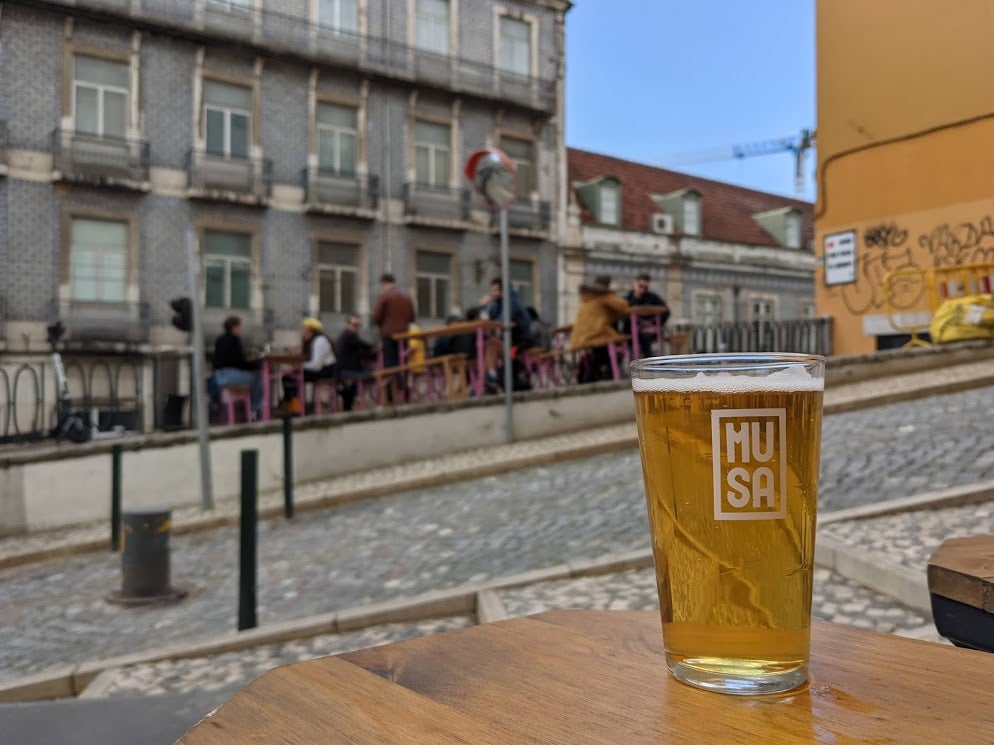Booze for breakfast: How Portuguese restaurants are trying to get round their Covid curfew
If you want to dine out in the Portuguese capital during the current pandemic, you really have to start early, reports Jorge Branco in Lisbon

Until the day he died, chef Leopoldo Garcia Calhau’s grandfather would take a shot of bagaço, a Portuguese liquor made from leftover grapes, every morning before breakfast. As restaurants across the country looked for ways to adapt to a 1pm weekend lockdown imposed to stop a raging coronavirus second wave, the bracing custom became an inspiration. The Lisbon chef brought back the mata bicho (literally “kill the bug”) tradition to give diners a no-holds-barred weekend dinner at 9.30am instead of 9.30pm.
If a shot of rough liquor and an oyster on an empty stomach isn’t your style, how about a “tired horse soup” of bread doused in red wine and sugar? Diners at Taberna do Calhau have also been treated to a modernised version of the dish formerly fed to – depending on who you ask – tired horses or tired humans (even children) to get them through the day.
“We need to have fun because we have a lot of problems of course,” Mr Calhau says.
“And we have to try to do something because I have also my employees I have to pay in the end of the month.
“If I don’t do anything, in the end of the month what am I gonna do? It’s crazy.”
Breakfast booze isn’t limited to his modern “tavern” in the winding streets of Mouraria. You’ll find port served with French toast, with more wine glasses on the tables of another mata bicho breakfast at Taberna da Rua das Flores, in the normally buzzing Chiado neighbourhood. Further down the steep hill, uncharacteristically clear of puffing tourists, it’s not unusual to see half the tables nursing morning beers at an upmarket central square kiosk after raiding the nearby organic farmers’ market.
These quirky adaptation efforts belie a difficult truth. When the Portuguese government introduced a 1pm weekend curfew across most of the country in early November, it was another blow to a sector already devastated by the pandemic.
The measure is aimed largely at stopping extended families from gathering for weekend lunches, an integral part of life. But it robs restaurants of some of their most lucrative meal periods. Earlier this month, some prominent restaurant and nightlife personalities ended an almost-week-long hunger strike outside the Assembly of the Republic. Along with survival grants and tax reductions, they want an end to the weekend curfew.
Mr Calhau’s unusual approach has paid off, with a full house most weekends. When British cook Max Phillips visits, the “tea at 11” menu is inspired by farmers in the rural Alentejo region coming in from a hard morning’s work to tuck into petiscos (similar to tapas) at their local cafe. Battered razor clams and a combination of scarlet prawn, sous vide poached egg and paper-thin pork belly bacon soon give way to more hearty fare: a pork crackling sandwich and half a grilled lamb’s head.
This is a p***-up, mate. This is a f***ing p***-up
Naturally there’s ample Portuguese wine to wash it all down.
“This is a p***-up, mate. This is a f***ing p***-up,” laughs Mr Phillips, who says he was planning to work at Taberna do Calhau before being offered a job at Alma, a renowned restaurant with two Michelin stars.
“This guy [Mr Calhau] is awesome. You come in at 10 o’clock, you have a lovely meal, you have a nice few glasses of wine, you f*** off.
“He’s got it. It’s perfect.”
Elsewhere in the city a craft beer brewery is flipping sourdough, ricotta and pecorino pancakes and pouring pints made from the very same sourdough starter.
Guilherme Naylor is rehydrating after a morning session at the nearby gym.
“It was good. The beer is good. Basically I like to drink craft beer, good beer,” the smiling Brazilian says, still wearing shorts from his workout.
“There’s a difference, obviously, [being in the morning] but in fact I think the weather today helped us.”
But these creative concepts are exceptions to the rule. Two-Michelin-starred Belcanto cut weekday lunch prices in half for a month to drum up business. Many restaurants simply stopped opening on weekends or closed for holidays and never came back.
Most others have gone back to the takeaway or delivery models that keep money trickling in but sacrifice up to 30 per cent of the bill to platforms such as Uber Eats and Glovo. According to an Association of Hotel, Restaurant and Similar Establishments of Portugal survey, 49,000 jobs had already disappeared from the sector when the new restrictions came in and 41 per cent of restaurants and similar businesses had considered insolvency. The association says almost two-thirds of restaurants and bars are now three months or more behind on rent.
After locking down earlier than most for the first wave, prime minister António Costa’s government has been trying to walk a fine line between protecting Portugal’s national health system and equally vulnerable economy. The country of 10 million is only slowly descending from a peak of more than 5,000 new cases a day and has one of the highest per capita infection rates in Europe. The hunger strikers have been denied an audience but economy minister Pedro Siza Vieira has agreed to sit down with more “formal” groups representing the sector.
The government points to more than €1bn worth of grants and loans available to the sector in the form of wage subsidies, partial compensation for weekend profit losses, and other measures. Commercial rent subsidies of up to 50 per cent for small and medium businesses hardest hit by the pandemic were approved last Wednesday.
As the weekend curfew continues in Lisbon, Porto and 111 other municipalities with a high infection rate, cafes and supermarkets are often packed and some people simply meet their family earlier in the day.
But according to widely respected epidemiologist Baltazar Nunes, speaking at a meeting of politicians and experts earlier this month, the weekend restrictions, which have also included temporary bans on travelling outside of the local council, have contributed to slowing the spread.
Back outside Taberna do Calhau, Mr Phillips is chatting with product designer Tiago Tomás and Miguel Cadete, deputy director of major Portuguese newspaper Expresso and a close friend of Mr Calhau.
“I think we can all agree absolutely that these restrictions are total b******s,” Mr Phillips asserts.
The two Portuguese insist the measures are necessary but the restaurant industry needs more help.
In either case, Mr Tomás says, the Portuguese have a famous capacity to adapt to tough situations.
“One of the good things that Covid brings is disrupting what you consider lunch and dinner as a moment of the day,” he says.
“And so yeah, you simply have to readapt, to readjust yourself to the environment and the constraints that you have.”



Join our commenting forum
Join thought-provoking conversations, follow other Independent readers and see their replies
Comments